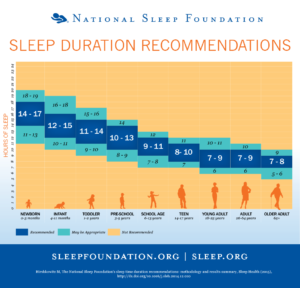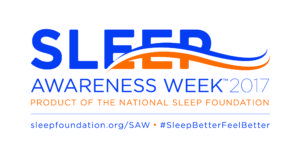
If pain is the fifth vital sign, then maybe sleep should be the fifth food group.
There is no doubt that sleep is as essential to good health as food. Yet millions of Americans cut into their sleep in order to get everything done that they feel they need to do. The National Sleep Foundation says that four out of ten Americans report that at least once a week their daily activities are significantly affected by lack of sleep.
Family caregivers and sleep
Family caregivers are no exception. At [Your Home Care Business], we see this all the time. Even if you don’t live with the person you care for, anxiety is a prime culprit for insomnia, as is depression. And family caregivers have more than their fair share of both.
Sleep problems take many forms
- Inability to fall asleep
- Inability to get back to sleep if awakened in the middle of the night
- Awakening too early in the morning
Dementia caregivers: the most sleep deprived
People caring for a person with dementia experience greater impact on their sleep than other caregivers do. A study by the Family Caregiver Alliance revealed that
- 70% of “dementia caregivers” report sleep problems;
- 60% say they get less than seven hours of sleep at night;
- 41% say they are being awakened in the night by the person they care for;
- 10%-20% report using alcohol or medication to go to sleep.

Alcohol is counterproductive
Although you may find the drowsiness of alcohol helps you fall asleep, behind the scenes, alcohol disrupts other rhythms. It activates parts of your brain that are likely to cause you to wake up partway through the night. It also interrupts REM sleep, the deepest and most restorative sleep. Even if you do sleep through the night, you will not wake up as refreshed as you would without the alcohol. It also leads to more trips to the bathroom in the middle of the night.

How much sleep is enough?
According to the National Sleep Foundation, optimal sleep per night varies by age:
- 7-9 hours for adults ages 26-64 (under certain circumstances, 6 or 10 hours may be appropriate)
- 7-8 hours for adults age 65+ (5-6 hours may be appropriate, or even 9 hours. It depends on several factors)
A sleep deficit (or “sleep debt”) builds up over time. As a rule of thumb, you need two nights of good sleep to make up for one night of bad sleep.

Consequences of not enough sleep
Lack of sleep has been shown to contribute to depression, anxiety, weight gain, and low energy. It also is a prime factor behind car crashes and work-related accidents.
Benefits of sleep
On the flip side, getting enough sleep contributes to improved well-being, clearer thinking, increased productivity, more energy, and overall better quality of life.
What you can do
As a family caregiver, if you find your sleep is disrupted, take it seriously. Consider a good night’s sleep as vital as eating. You will be doing yourself a favor and providing better care for your loved one if you address the problem directly. Not getting enough sleep is one of the most common reasons that a family ultimately decides a relative must live in a long-term care facility. Here are some options to consider:
- Practice relaxation techniques and good sleep habits.
- For specific sleep issues, follow these tips from the National Sleep Foundation.
- Talk to your doctor about best approaches for insomnia.
- Talk to your loved one’s doctor if the person you care for is waking you up at night.
- If your loved one does not sleep well, hire overnight help now and then so you can sleep.
Coping with caregiver stress

We are focusing on insomnia in this blog post in honor of Sleep Awareness Week, April 23-29. But many other issues can cause a family caregiver to burn out. Learn more preventive techniques by reading our article about Coping with Stress. We are the [Your Service Area] experts in family caregiving and have helped many, many families through the difficult eldercare years. Give us a call at [Your Phone Number]. You don’t have to do this alone.

